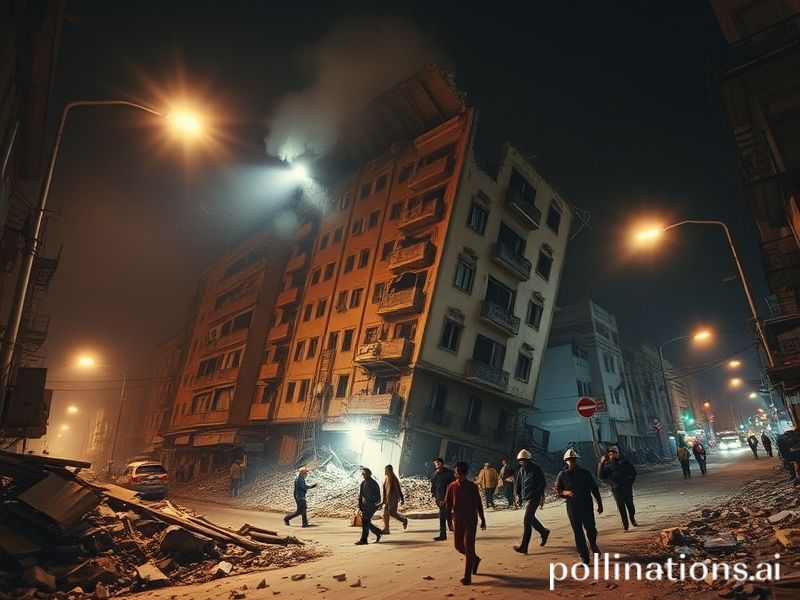Global Fault Lines: How Today’s Earthquake Became Everyone’s Problem Before Sunrise
The ground shook this morning—again—somewhere between Tashkent and Tehran, and within minutes the entire planet began its familiar pantomime of panic, solidarity, and opportunistic brand tweets. A 6.8 magnitude quake rattled the steppe at 04:17 UTC, the sort of hour when seismologists are already awake (they never really sleep) and the rest of us pretend we knew what UTC meant before Googling it. Casualty figures trickled out like late-stage espresso: low for now, but rising with the sun and the inevitable aftershocks of both tectonic and bureaucratic variety.
From Geneva to Jakarta, the earthquake now serves as the world’s least-requested group chat. The Swiss run the humanitarian spreadsheets, the Turks dispatch their gleaming new SAR dogs—each one Instagram-certified—and the Americans dust off satellite imagery that can read a cigarette pack from orbit but still can’t locate a functioning democracy. Meanwhile, China’s state media toggles between condolences and a helpful infographic explaining why Belt-and-Road concrete is technically “quake-resilient,” a claim that will be stress-tested sooner than anyone hopes.
Global supply chains shivered in sympathy. A single magnesium plant outside the epicenter—responsible for 7 % of the planet’s alloy output—paused operations, which is how an earthquake in Central Asia instantly becomes a production delay for German brake pads and a margin call in Detroit. The markets, those finely tuned hysterics, marked rare-earth futures up 2 % before breakfast because nothing says “disaster response” like a quick arbitrage opportunity.
Back on the human ledger, the usual carousel of NGOs activated faster than a pop-up ad for discount VPNs. Within two hours, Oxfam had released a pre-written press release with blank spaces for death toll and adjectives, while TikTok influencers raced to the ruins to film thirty-second tutorials on how to lift rubble with “positive vibes.” One Norwegian vlogger livestreamed himself hugging a bewildered grandmother who, judging by her expression, would have preferred actual blankets.
Diplomacy, never one to miss a tremor, kicked into gear. The EU pledged “immediate assistance” in the form of a coordinating committee that will hold its first meeting in six weeks. Russia offered field hospitals and, incidentally, a reminder that it still has borders in every direction. Ukraine sent rescue teams despite being rather preoccupied, because nothing advertises resilience like saving strangers while your own cities are still under excavation. Analysts call it soft power; cynics call it the world’s most macabre talent show.
Scientists, bless their graphs, remind us that 2024 is on track to be another “totally normal” year of above-average seismic activity—like calling a tax audit “routine financial curiosity.” Climate change isn’t causing earthquakes, they insist, but it is swelling the coastal cities that sit atop them, a bit like booking a suite on the Titanic after spotting the iceberg. Meanwhile, insurers quietly reprice entire postal codes, proving once again that capitalism is the only fault line that never sleeps.
The broader significance? The planet is shrinking faster than our attention spans. A shudder in the Eurasian plate ricochets through lithium contracts, refugee routes, and your cousin’s vacation plans. We are all, geologically speaking, next-door neighbors sharing one very thin wall. The earth demonstrates its indifference with clockwork precision, and humanity responds with crowd-funding campaigns and commemorative emojis. Each disaster is a pop quiz on how quickly we can remember our common fragility—and how soon after we can forget it.
So, stock up on canned goods, download the emergency app you’ll never open, and spare a thought for the seismologist who just corrected your pronunciation of “Gutenberg-Richter.” The next earthquake is already queued, politely waiting its turn beneath some other unsuspecting cornfield or megacity. Until then, we scroll, we donate, we meme. Because if the ground insists on moving, the least we can do is keep our sense of humor from going completely underground.







